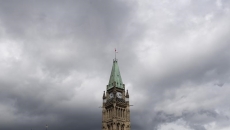As more winter weather rolls in provincewide, now is the time for British Columbians to prepare for extremely cold temperatures, power outages and slick streets.
A series of strong storms will clash with cold Arctic air throughout B.C. during the holidays, according to Environment and Climate Change Canada. Periods of heavy and blowing snow, freezing rain and very cold weather are likely in many parts of B.C. between now and New Year’s Day.
Residents should follow directions from First Nations and local governments. In the event of extreme cold temperatures, warming centres may be opened to help protect vulnerable populations. Emergency Management BC will work in partnership with First Nations and local governments to respond quickly to changing weather conditions.
“We are once again facing the potential for extreme weather in our province,” said Mike Farnworth, Minister of Public Safety and Solicitor General. “It is imperative that we all watch the weather carefully and look out for those who are most vulnerable.”
Drivers are reminded to plan ahead and drive according to weather and road conditions if they must travel during the upcoming holiday season. This is especially important, given the impacts of the floods that caused significant damage to British Columbia’s highways and roads.
“I encourage everybody to travel only if necessary this winter to keep each other safe and keep roads open, so essential goods can be delivered to communities,” said Rob Fleming, Minister of Transportation and Infrastructure. “Road conditions can change quickly. If you must travel, check the weather and plan routes before you leave to be as prepared as possible.”
Highway 5 is available to commercial vehicles with a minimum licensed gross vehicle weight (GVW) of 11,794 kilograms. With most commercial vehicles moving to Highway 5, travel restrictions have been lifted from highways 3 and 99. However, Highway 99 has weight restrictions in effect, and vehicles weighing more than 14,500 kilograms are not permitted to travel the route.
Highways 3 and 99 are mountainous routes with steep grades and winding curves, and weather and road conditions can change quickly. People who are not experienced with winter driving in the mountains are urged to use extreme caution on both routes and may want to consider alternatives for travel between the Lower Mainland and Interior.
For those who do decide to travel, enhanced winter maintenance services are in place where necessary and will remain for as long as needed through the winter season. Drivers are advised to reduce their speed and use caution when they encounter poor weather or limited visibility.
As winter tire regulations are in effect on designated routes, drivers are encouraged to get the best tires available. These include tires with the mountain/snowflake symbol, which provide the best traction and handling in the most challenging winter weather conditions.
A little preparation can go a long way to keeping people safe during stormy, wintry conditions. Here are some tips to keep safe this winter:
- Prepare for extreme cold: Environment Canada will issue arctic outflow warnings when extremely cold winds that can create wind chill values of -20 C or colder are forecast for six or more hours. Use caution and limit outdoor exposure under these conditions, as there is an increased risk of frostbite and hypothermia. Parents and pet owners should be particularly mindful of children and pets being outdoors during these times.
- Wear your winter gear: Always wear clothing appropriate for the weather. Dressing in layers, with a wind- and water-resistant outer layer, provides flexibility for changing conditions. Cover as much exposed skin as possible by wearing hats, scarves and gloves to avoid frostbite. Try to stay dry and change out of wet clothing as soon as possible.
- Be prepared for power outages: Severe weather can cause power outages. Be prepared for up to one week by developing a household emergency plan and putting together an emergency kit. If you come across a downed or damaged power line, assume it is live and a danger. Stay back at least 10 metres (the length of a bus) and call 911 immediately to report.
- Emergency shelters available: People in need of a warm, safe place to stay during the cold and wet winter months will have access to additional emergency shelter spaces. All shelters, including extreme-weather response shelters, are open throughout B.C. This winter, the Province is providing more than 1,900 temporary shelter spaces and nearly 360 extreme-weather response shelter spaces to ensure people experiencing homelessness have a warm place to sleep and get out of the cold and rain. These emergency shelters supplement more than 2,250 permanent, year-round shelter spaces. The extreme weather response shelters are available overnight when a community issues an extreme-weather alert.
- Be prepared on the road: People should bring warm clothing that does not restrict movement when driving and ensure their vehicles are equipped with a full tank of fuel, a windshield scraper and snow brush, food and water, a first-aid kit and other emergency supplies. If stuck or stranded, people should stay in their vehicles and call 911 for roadside assistance.






